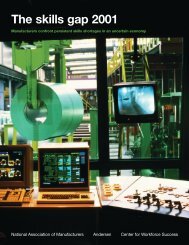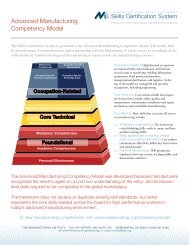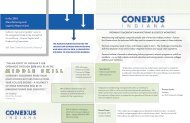2005 Skills Gap Report - Manufacturing Institute
2005 Skills Gap Report - Manufacturing Institute
2005 Skills Gap Report - Manufacturing Institute
You also want an ePaper? Increase the reach of your titles
YUMPU automatically turns print PDFs into web optimized ePapers that Google loves.
<strong>2005</strong> <strong>Skills</strong> <strong>Gap</strong> <strong>Report</strong><br />
Executive Summary<br />
The vast majority of American manufacturers are experiencing<br />
a serious shortage of qualified employees, which in turn is causing<br />
significant impact to business and the ability of the country<br />
as a whole to compete in a global economy. This is the key finding<br />
of the <strong>2005</strong> <strong>Skills</strong> <strong>Gap</strong> Survey.<br />
The problem for U.S. manufacturers is that this challenge is not<br />
universal. Countries with rich educational heritages, e.g., India, China<br />
and Russia, are graduating millions more students each year from<br />
college than the United States. 1 These highly educated individuals are<br />
actively participating in the development of innovative new products<br />
without regard for historical barriers, such as geography – thanks to<br />
technologies such as broadband, inexpensive Internet-ready laptops,<br />
and collaborative tools.<br />
With such international talent readily available and significant shortages<br />
existing at home, it is clear that the future of American manufacturing<br />
may now be at stake.<br />
A Serious, Persistent Shortage<br />
The details behind the talent shortage reveal a stark reality. More than<br />
80 percent of respondents indicated that they are experiencing<br />
a shortage of qualified workers overall – with 13 percent<br />
reporting severe shortages and 68 percent indicating moderate shortages.<br />
Also worrisome is the finding that 90 percent of respondents<br />
indicated a moderate to severe shortage of qualified skilled production<br />
employees, including front-line workers, such as machinists,<br />
operators, craft workers, distributors, and technicians. As expected,<br />
the research showed that engineers and scientists are in short supply,<br />
with 65 percent of manufacturers reporting deficiencies – 18 percent<br />
severe and 47 percent moderate.<br />
In addition to shortages of various types of employees, manufacturers<br />
surveyed reported they are also dissatisfied with the skills of their current<br />
employees. Among respondents to this national survey, nearly half<br />
indicated their current employees have inadequate basic employability<br />
skills, such as attendance, timeliness and work ethic, while 46 percent<br />
reported inadequate problem-solving skills, and 36 percent indicated<br />
insufficient reading, writing, and communication skills.<br />
Significant Business and Economic Impact<br />
The talent shortage being reported is not a theoretical or distant<br />
problem. In fact, 83 percent of respondents indicated that these<br />
shortages are currently impacting their ability to serve customers.<br />
Specifically, the survey found that skill deficiencies are causing<br />
difficulties for manufacturers in terms of their ability to maintain<br />
production levels consistent with customer demand (56 percent), to<br />
achieve productivity targets (43 percent), and to achieve or maintain<br />
target levels of customer service and satisfaction (33 percent).<br />
Clearly, this situation is untenable for America. Although our manufacturing<br />
sector has been able to remain vibrant and to compete successfully<br />
in a global economy, its ability to do so in the future is predicated<br />
on the availability of a highly skilled, innovative, “high-performance<br />
workforce.” Without a sufficient supply of these types of employees,<br />
the manufacturing sector will suffer – which in turn will have a detrimental<br />
impact to the nation’s overall economic health.<br />
The Key to Business Success<br />
Notwithstanding the bleak picture of the workforce situation today,<br />
manufacturers surveyed believe that having a high-performance workforce<br />
is the most important driver of future business success. Nearly three<br />
out of every four respondents selected this as a key to future success.<br />
The second most commonly selected driver of success was “new product<br />
innovation” – which is also inextricably linked to employee quality<br />
and performance. Surprisingly, “low-cost producer status” ranked only<br />
third on the list of most important drivers of future business success,<br />
but not far behind in terms of percentages. In past studies, manufacturers<br />
have consistently ranked this as their number one response<br />
– but perhaps they have come to accept as a given that ongoing<br />
pursuit of lean operations and efficiency is essential to success in an<br />
incessantly competitive global manufacturing industry. To stay ahead<br />
of the pack, successful companies must constantly push the innovation<br />
envelope, which requires innovative and high-performing employees.<br />
As a result, the new manufacturing mantra may be: “high-performing<br />
and innovative, but lean.”<br />
1







